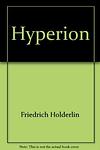Friedrich Holderlin
Friedrich Hölderlin was a significant German lyric poet whose work bridges the Classical and Romantic schools of thought. Born on March 20, 1770, in Lauffen am Neckar, Hölderlin was known for his intense, emotive poetry that often explored themes of nature, the divine, and the individual's relationship with society. His style evolved over his career, and he is particularly noted for his odes and elegies. Despite struggling with mental health issues later in life, which led to a long period of hospitalization, Hölderlin's influence on German literature and philosophy, particularly within existentialism and post-Kantian idealism, has been profound. His works include 'Hyperion' and 'The Death of Empedocles', and his poetry has inspired many subsequent writers and thinkers.
Books
This list of books are ONLY the books that have been ranked on the lists that are aggregated on this site. This is not a comprehensive list of all books by this author.
-
1. Hyperion
The novel explores the life and thoughts of a young German named Hyperion who spends much of his time in Greece. He is torn between his love for his homeland and his disgust with contemporary German society. Through a series of letters to his German friend Bellarmin, Hyperion narrates his participation in the Greek struggle for independence from the Ottoman Empire, his disillusionment with war, and his intense love for the Greek woman Diotima. The novel is a meditation on beauty and suffering, wisdom and madness, and the dichotomy between the ideal and the real.
-
2. Poems of Friedrich Hölderlin
This book is a collection of poems by a renowned German poet of the late 18th and early 19th century. The poems reflect the author's deep connection with nature, his philosophical musings on the divine and the human condition, and his struggles with mental illness. His work is seen as a bridge between the rationalism of the Enlightenment and the passion of Romanticism, and his unique style and themes have had a profound influence on later generations of poets and thinkers.

